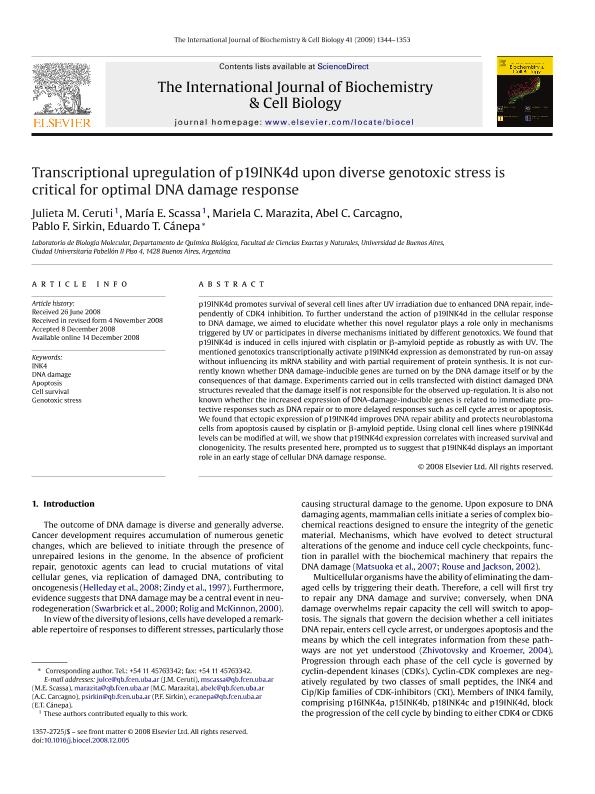Mostrar el registro sencillo del ítem
dc.contributor.author
Ceruti, Julieta María

dc.contributor.author
Scassa, Maria Elida

dc.contributor.author
Marazita, Mariela Claudia

dc.contributor.author
Carcagno, Abel Luis

dc.contributor.author
Sirkin, Pablo Federico

dc.contributor.author
Canepa, Eduardo Tomas

dc.date.available
2017-11-13T13:01:28Z
dc.date.issued
2008-12
dc.identifier.citation
Ceruti, Julieta María; Scassa, Maria Elida; Marazita, Mariela Claudia; Carcagno, Abel Luis; Sirkin, Pablo Federico; et al.; Transcriptional upregulation of p19INK4d upon diverse genotoxic stress is critical for optimal DNA damage response; Elsevier; International Journal Of Biochemistry And Cellular Biology; 41; 6; 12-2008; 1344-1353
dc.identifier.issn
1357-2725
dc.identifier.uri
http://hdl.handle.net/11336/28001
dc.description.abstract
p19INK4d promotes survival of several cell lines after UV irradiation due to enhanced DNA repair, independently of CDK4 inhibition. To further understand the action of p19INK4d in the cellular response to DNA damage, we aimed to elucidate whether this novel regulator plays a role only in mechanisms triggered by UV or participates in diverse mechanisms initiated by different genotoxics. We found that p19INK4d is induced in cells injured with cisplatin or beta-amyloid peptide as robustly as with UV. The mentioned genotoxics transcriptionally activate p19INK4d expression as demonstrated by run-on assay without influencing its mRNA stability and with partial requirement of protein synthesis. It is not currently known whether DNA damage-inducible genes are turned on by the DNA damage itself or by the consequences of that damage. Experiments carried out in cells transfected with distinct damaged DNA structures revealed that the damage itself is not responsible for the observed up-regulation. It is also not known whether the increased expression of DNA-damage-inducible genes is related to immediate protective responses such as DNA repair or to more delayed responses such as cell cycle arrest or apoptosis. We found that ectopic expression of p19INK4d improves DNA repair ability and protects neuroblastoma cells from apoptosis caused by cisplatin or beta-amyloid peptide. Using clonal cell lines where p19INK4d levels can be modified at will, we show that p19INK4d expression correlates with increased survival and clonogenicity. The results presented here, prompted us to suggest that p19INK4d displays an important role in an early stage of cellular DNA damage response
dc.format
application/pdf
dc.language.iso
eng
dc.publisher
Elsevier

dc.rights
info:eu-repo/semantics/openAccess
dc.rights.uri
https://creativecommons.org/licenses/by-nc-sa/2.5/ar/
dc.subject
Ink4
dc.subject
Dna Damage
dc.subject
Apoptosis
dc.subject
Genotoxic Stress
dc.subject.classification
Otras Ciencias Biológicas

dc.subject.classification
Ciencias Biológicas

dc.subject.classification
CIENCIAS NATURALES Y EXACTAS

dc.title
Transcriptional upregulation of p19INK4d upon diverse genotoxic stress is critical for optimal DNA damage response
dc.type
info:eu-repo/semantics/article
dc.type
info:ar-repo/semantics/artículo
dc.type
info:eu-repo/semantics/publishedVersion
dc.date.updated
2017-09-29T16:44:36Z
dc.identifier.eissn
1878-5875
dc.journal.volume
41
dc.journal.number
6
dc.journal.pagination
1344-1353
dc.journal.pais
Países Bajos

dc.journal.ciudad
Amsterdam
dc.description.fil
Fil: Ceruti, Julieta María. Universidad de Buenos Aires. Facultad de Ciencias Exactas y Naturales. Departamento de Química Biológica. Laboratorio de Biología Molecular; Argentina. Consejo Nacional de Investigaciones Científicas y Técnicas; Argentina
dc.description.fil
Fil: Scassa, Maria Elida. Universidad de Buenos Aires. Facultad de Ciencias Exactas y Naturales. Departamento de Química Biológica. Laboratorio de Biología Molecular; Argentina. Consejo Nacional de Investigaciones Científicas y Técnicas; Argentina
dc.description.fil
Fil: Marazita, Mariela Claudia. Universidad de Buenos Aires. Facultad de Ciencias Exactas y Naturales. Departamento de Química Biológica. Laboratorio de Biología Molecular; Argentina. Consejo Nacional de Investigaciones Científicas y Técnicas; Argentina
dc.description.fil
Fil: Carcagno, Abel Luis. Universidad de Buenos Aires. Facultad de Ciencias Exactas y Naturales. Departamento de Química Biológica. Laboratorio de Biología Molecular; Argentina. Consejo Nacional de Investigaciones Científicas y Técnicas; Argentina
dc.description.fil
Fil: Sirkin, Pablo Federico. Universidad de Buenos Aires. Facultad de Ciencias Exactas y Naturales. Departamento de Química Biológica. Laboratorio de Biología Molecular; Argentina. Consejo Nacional de Investigaciones Científicas y Técnicas; Argentina
dc.description.fil
Fil: Canepa, Eduardo Tomas. Universidad de Buenos Aires. Facultad de Ciencias Exactas y Naturales. Departamento de Química Biológica. Laboratorio de Biología Molecular; Argentina. Consejo Nacional de Investigaciones Científicas y Técnicas; Argentina
dc.journal.title
International Journal Of Biochemistry And Cellular Biology

dc.relation.alternativeid
info:eu-repo/semantics/altIdentifier/url/http://www.sciencedirect.com/science/article/pii/S1357272508004846
dc.relation.alternativeid
info:eu-repo/semantics/altIdentifier/doi/https://doi.org/10.1016/j.biocel.2008.12.005
Archivos asociados
